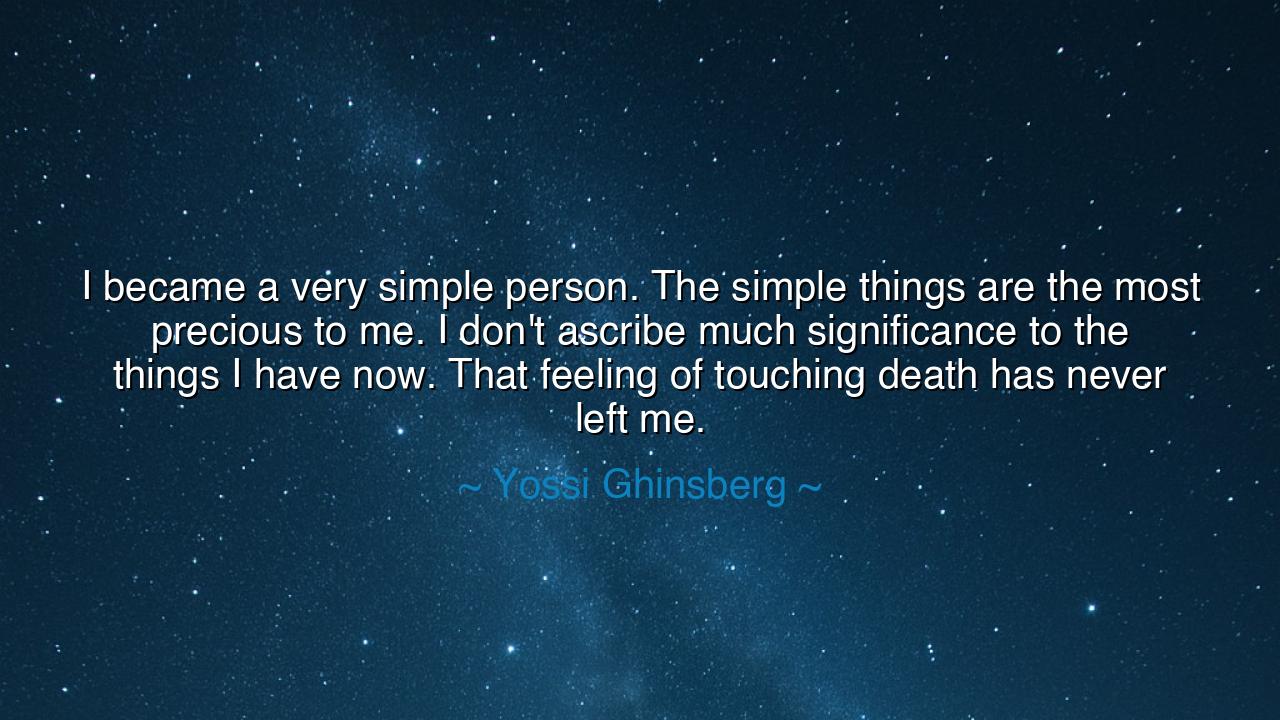
I became a very simple person. The simple things are the most
I became a very simple person. The simple things are the most precious to me. I don't ascribe much significance to the things I have now. That feeling of touching death has never left me.






The adventurer and survivor Yossi Ghinsberg, who walked through the mouth of death and returned, once said: “I became a very simple person. The simple things are the most precious to me. I don’t ascribe much significance to the things I have now. That feeling of touching death has never left me.” These words, spoken by one who has stood at the edge of existence, carry the weight of a revelation. In them lives the wisdom of a man who has seen the thin veil between life and nothingness — and who returned to teach that simplicity, not abundance, is the true crown of the living.
From the beginning of time, the ancients have taught that the one who faces death sees life most clearly. For when all illusions are stripped away, when the body trembles and the breath grows shallow, the spirit sees what truly matters — not gold, not fame, not possessions, but the miracle of being. Yossi Ghinsberg, lost for weeks in the Bolivian jungle, starving, alone, and haunted by despair, met that truth not in temples or books, but in the living wilderness. When he was rescued, he was no longer merely a man — he was a soul awakened. His words are not about fear, but about rebirth — the transformation that follows the touch of mortality.
“The simple things are the most precious to me,” he says. These are not the words of one who has renounced the world in bitterness, but of one who has learned to see it anew. To drink clean water after thirst, to feel the warmth of sunlight, to hear another human voice — such things become holy when you have once thought you would never feel them again. In the language of the ancients, such understanding is called gnosis, a sacred knowing that cannot be taught, only lived. The one who has faced the darkness learns to bow before the ordinary, for in the ordinary lies the divine.
Consider the story of Marcus Aurelius, emperor of Rome and philosopher of endurance. Though surrounded by power and luxury, he wrote in his Meditations: “Look to the small things — the morning light, the smell of bread, the kindness of a friend — for in them is the essence of life.” Even as plague ravaged his empire and death shadowed every hall, he learned to find peace not in conquest, but in simplicity. His wisdom and Ghinsberg’s are the same: that all grandeur fades, but gratitude remains eternal. When one stands close to death, the scales fall from the eyes, and the heart learns what no comfort can teach — that life itself is enough.
“The feeling of touching death has never left me.” This line is the pulse of Ghinsberg’s truth. It is not horror he describes, but remembrance — a constant awareness that life is fragile, and therefore sacred. Those who have brushed against mortality often live with a strange light in their eyes, for they walk each day knowing how easily it could end. They do not cling to possessions or quarrels, for they have seen how quickly such things turn to dust. They live not in fear, but in clarity — a quiet reverence that transforms every breath into prayer.
The origin of such transformation lies in what the ancients called catharsis — purification through suffering. When Yossi Ghinsberg emerged from the jungle, he had shed not only fear, but vanity. His near-death experience burned away the excess of the world and left only the essence: humility, gratitude, and simplicity. This is the same journey taken by countless mystics and warriors before him, those who descended into darkness only to return with light. It is the paradox of existence — that one must lose everything to understand the value of anything.
From this, a lesson emerges, luminous and eternal: Do not wait for death to teach you how to live. Let gratitude be your daily practice, and simplicity your chosen wealth. Look around — the air you breathe, the warmth of another’s hand, the beauty of dawn — these are treasures beyond measure. Do not worship the things that rust or rot; worship the fleeting gift of being alive. Walk lightly upon the earth, for every step is a privilege denied to many.
Thus, Yossi Ghinsberg’s words become a teaching for all who listen: that the touch of death is not a curse, but a revelation. Those who have faced the end carry within them the secret of peace — to live fully, to love deeply, to want little, and to marvel always. In the silence between heartbeats lies the truth he found in the jungle: that life, stripped of all pretense, is already enough — radiant, sacred, and unspeakably precious.






AAdministratorAdministrator
Welcome, honored guests. Please leave a comment, we will respond soon